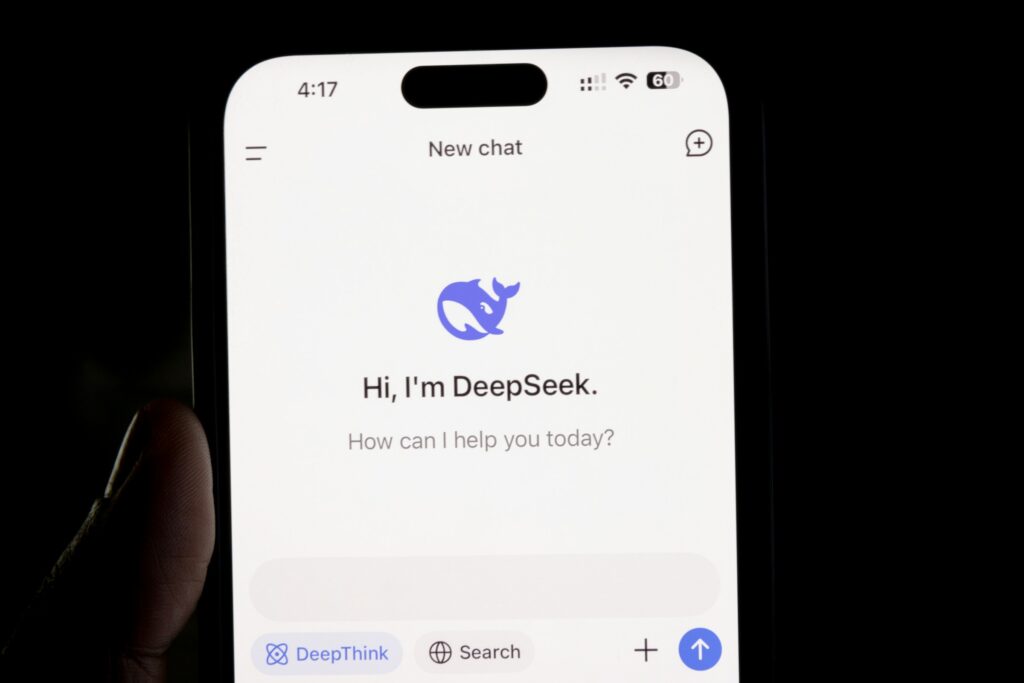The AI world is upside down: South Korea has temporarily banned access to the Chinese AI application DeepSeek. The South Korean Personal Information Protection Commission (PIPC) justifies this step with serious data protection concerns. This decision highlights the complex relationship between AI progress and data protection.
The DeepSeek ban in South Korea marks a turning point in the global debate on AI regulation and data protection. The PIPC found that DeepSeek was not fully compliant with local data protection laws. The National Intelligence Service (NIS) went even further, accusing DeepSeek of "excessive" collection of personal data.
The effects of this ban extend far beyond South Korea's borders. Other countries such as Italy, Taiwan and Australia have also taken measures against DeepSeek. In the US, several federal agencies, including NASA and the Department of Defense, have banned the use of DeepSeek for their employees.
Important findings
- South Korea has blocked DeepSeek due to data protection concerns
- DeepSeek stores user data on servers in China
- Other countries have taken similar measures
- Security researchers found weaknesses in the app
- The ban shows the tension between AI progress and data protection
Background to the ban on DeepSeek in South Korea
South Korea's decision to ban DeepSeek marks a turning point in the Legislation Artificial intelligence. On February 17, 2025, the app was removed from local stores, causing a worldwide sensation.
What is DeepSeek?
DeepSeek is an AI chatbot that was released in late January and quickly rivaled leading US programs such as ChatGPT. The app uses advanced technology, including Nvidia A100 chips, which raises questions about ethical AI.
Reasons for the ban
South Korea's Commission for the Protection personal data (PIPC) expressed concerns about DeepSeek's opaque data processing. The app collects extensive user data, including location information and browsing habits. These practices could violate strict South Korean data protection laws.
The South Korean intelligence service NIS also discovered inconsistent answers depending on the language of the request. This raised concerns about possible political influence and Technology risks.
Chronology of events
- January 30: Italy is the first country to ban DeepSeek
- Early February: Texas bans DeepSeek on government devices
- Mid-February: NASA and Navy join the ban
- February 17, 2025: South Korea bans DeepSeek
This development could lead to increased scrutiny of foreign apps and stricter regulations worldwide. Belgium, Ireland and France have already announced that they will subject DeepSeek to a thorough investigation.
Data protection concerns in connection with AI
The rapid development of AI technologies is increasingly raising questions about data protection. The controversies surrounding Face recognition and Biometric monitoring are the focus of the debate.
AI and data protection: a complex relationship
AI systems such as DeepSeek collect and process enormous amounts of user data. This poses risks to privacy. The German Federal Office for Information Security warns that DeepSeek may collect keystroke patterns in order to identify users. Such practices awaken Privacy concerns with experts and authorities.
Global data breaches: Case studies
Data protection breaches by AI systems are not uncommon. In Italy, the data protection authority blocked a Chinese chatbot for non-compliance with the guidelines. In South Korea, the Facial recognition controversy to a temporary ban on DeepSeek. The Data Protection Commission justified this with inadequate protective measures.
| Country | Measure | Reason |
|---|---|---|
| South Korea | Ban on DeepSeek | Data protection concerns |
| Italy | Blocking a chatbot | Non-compliance with guidelines |
| Germany | Test procedure in preparation | Security concerns |
These cases show the need for strict regulations in AI development. Experts compare the value of data with that of oil and emphasize the urgency of data protection in the digital era.
Impact on companies in South Korea
The ban on DeepSeek in South Korea has far-reaching consequences for the country's technology industry. South Korea's technology policy is facing new challenges as companies have to adapt their strategies.
Short-term reactions from the industry
Many companies that used DeepSeek are now looking for alternatives. The South Korean data protection authority PIPC has removed the app from the app stores. Users who have already installed DeepSeek may continue to use it, but only "with caution".
Possible long-term consequences
The decision could affect the AI regulation in South Korea. Companies need to be prepared for stricter data protection guidelines. This could promote the development of ethical AI solutions, but also slow down innovation.
| Aspect | Impact |
|---|---|
| Privacy | Increased controls |
| Innovation | Possible slowdown |
| Ethical AI | Stronger focus |
The debate surrounding DeepSeek shows that data protection is a top priority in the digital era. South Korean companies must now find ways to develop innovative AI solutions without violating data protection standards.
Alternatives to DeepSeek on the market
The ban on DeepSeek in South Korea raises the question of alternatives. AI-supported search solutions are a growing market that is served by various providers. The AI regulation plays an important role in the development and use of these technologies.
Competitors in the field of AI-supported search solutions
In addition to DeepSeek, there are established providers such as ChatGPT from OpenAI and Google Bard. These platforms offer similar functions, but differ in aspects such as Data protection and ethical AI development. DeepSeek was able to keep up with the leading US programs despite lower investments.
| Provider | Strengths | Weaknesses |
|---|---|---|
| ChatGPT | High accuracy, broad knowledge base | Data protection concerns, high development costs |
| Google Bard | Integration with Google services, regular updates | Limited availability, consistency problems |
| DeepSeek | Cost efficiency, rapid development | Regulatory challenges, security concerns |
Advantages and disadvantages of alternative technologies
The choice of an alternative to DeepSeek depends on various factors. Ethical AI and Technology risks are important aspects in the evaluation. While some providers are more heavily regulated, others may offer innovative features. Users must weigh up performance, data protection and security.

The development of AI security solutions will continue to progress in order to Technology risks minimize the risks. Companies and consumers should carefully consider the advantages and disadvantages of each alternative in order to make an informed decision.
The role of regulatory authorities
The Legislation Artificial intelligence in South Korea is facing new challenges. The DeepSeek case shows how regulatory authorities are actively intervening in South Korea's technology policy.
Institutions involved
The South Korean Personal Information Protection Commission (PIPC) plays a key role in AI regulation. It has removed DeepSeek from the app stores to ensure compliance with local data protection laws. The South Korean National Intelligence Service (NIS) also criticized DeepSeek's "excessive" data collection.
Regulatory framework for AI
The existing regulatory framework in South Korea is proving to be strict. The PIPC found that DeepSeek is not fully compliant with South Korean data protection laws. This could lead to legal consequences and jeopardize the future Legislation Artificial intelligence influence.
The PIPC will only resume the app's service once improvements have been made in accordance with South Korean data protection laws.
South Korea's technology policy is faced with the challenge of promoting innovation. and data protection at the same time to ensure privacy. The DeepSeek case could serve as a precedent for future AI regulations and redefine the balance between technological progress and data protection.
Practical impact on consumers
The ban on DeepSeek in South Korea has far-reaching consequences for users. The decision raises questions about Privacy concerns and Data protection AI on. Many consumers are unsure about how they should deal with AI technologies in the future.

Restrictions on use and precautionary measures
Users who installed DeepSeek before it was blocked can continue to use the service. However, the authorities recommend caution when using it. It is advised not to enter any personal data in order to minimize technology risks. These restrictions significantly alter access to information.
Consumer confidence and alternative solutions
The ban has shaken confidence in AI technologies. A survey shows that 78% of consumers are concerned on data protection in AI applications. Many are now looking for alternative sources of information. 48% of users have already restricted their use of AI applications.
| Impact | Percentage |
|---|---|
| Concerned consumers | 78% |
| Limited use of AI | 48% |
| Demand for transparency | 80% |
The development shows that consumers are increasingly critical of AI technologies. 80% are calling for more transparency in the use of data. This could lead to safer and more trustworthy AI solutions in the long term.
International reactions to the ban
The ban on DeepSeek in South Korea has caused a worldwide stir. South Korea's AI regulation and technology policy are the focus of global attention. Many countries are rethinking their own legislation on Artificial intelligence.
Opinions from other countries
In Germany, the Federal Office for Information Security (BSI) expressed concerns about the security of DeepSeek. The app captures keystroke patterns, which is considered risky for sensitive areas. Italy launched an investigation into possible breaches of the GDPR.
Taiwan and Australia banned DeepSeek for government agencies. In the USA, several federal authorities banned its use. Texas banned the app on government devices. These reactions show the growing concern about Data protection and national security in the context of AI applications.
Expert comments on the situation
Experts emphasize the need for balanced AI regulation. They warn of the risks of storing data on Chinese servers. Security researchers discovered vulnerabilities in DeepSeek, such as a lack of encryption. The global debate on AI security and data protection is intensifying as a result of the DeepSeek case.
South Korea's decision could set a precedent for global AI regulation.
The international community is watching with interest to see how South Korea's technology policy develops. The DeepSeek case could influence legislation on artificial intelligence in many countries.
Prospects for the AI security industry
The AI security industry is facing new challenges. The ban on DeepSeek in South Korea shows how important ethical AI and data protection. Companies must now focus more on security and trust.
Trends in the development of AI security solutions
New AI security solutions focus on data protection. They want to prevent technology risks such as unauthorized data collection. Biometric monitoring is viewed critically. Companies are working on systems that protect data better and are still effective.
Opportunities and challenges for companies
There are opportunities for companies in the field of ethical AI. Those who offer secure solutions can gain trust. The challenge lies in developing innovative technologies that combine data protection and performance. This is the only way to avoid bans like DeepSeek in the future.
